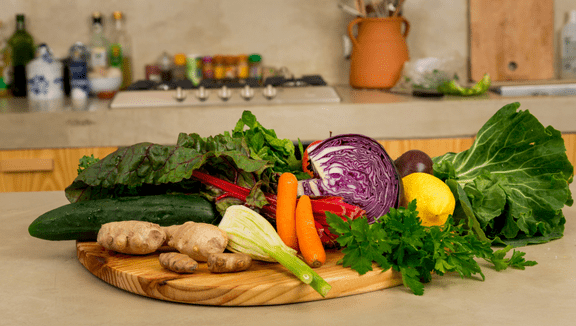
From a Chinese medicine perspective food is classified according to its attributes and the way it effects the balance of yin and yang energy in the body. In the cooler (yin) months our energy is occupied not only with its daily function to keep us healthy, it also requires yang energy to keep us warm. In order to provide the optimum conditions for healing imbalances, as well as supporting regular healthy functioning, we can greatly assist the body by eating naturally warming foods. And it’s not only foods that are heated or cooked that can achieve a warming effect. Adding a variety of herbs, spices, nuts and seeds will also bring your diet into balance and aid digestion to provide the greatest use of nutrients from the foods we eat.
Exploring the Spleen/Stomach in Traditional Chinese Medicine
In Traditional Chinese Medicine (TCM), the Spleen/stomach are seen as the central organs of digestion. They control the breaking down the food and assist the absorption of elements that nourish organs and tissues to increase Qi and blood in the body.
Spleen yang is often compared to a fire that warms food (including fluids) in order to metabolise them. By consuming too many cold foods in our diet, it can be like putting a wet blanket on top of the fire, smothering and impairing this metabolic action. As a result, signs of Spleen deficiency such as poor appetite, bloating and loose stools may become an issue.
There are three categories of food that can impair Spleen function.
- Food that is energetically cold.
- Food that is physically cold.
- Fried, greasy or sugary foods
Food that is energetically cold
In prescribing dietary therapy and herbal medicine in TCM, the energetic quality of a substance is always taken into account. For example, take ginger and watermelon both sitting at room temperature. Eating one would cool the body down (watermelon) and the other one would have a noticeable warming effect on the body (ginger).
In cooler months, and for some, all year through, too many energetically cooling foods such as a lot of fruit, salads, raw foods, vegetable juices, dairy foods (with the exception of yoghurt for most) etc. can cause signs of Spleen deficiency, particularly if they are not balanced with the introduction of warming foods.
Food that is physically cold
This includes things straight out of the fridge such as drinks or ice cream, or with ice added. In the case of water, warm or hot water will be absorbed more effectively.
Food that is fired, greasy or sugary
This includes food deep or shallow fried or food with a high amount of oil or sugar content such as chocolate cheeses and cured meats.
Supporting the spleen in cooler months
So what do you need to eat to assist spleen function and provide balance in the cooler months?
Cooking warms the energetics of food so focusing on recipes for soups, stews, and casseroles is a great start. Fruit can also be poached or stewed and vegetables can be sufficiently steamed. Combing small amounts of warm food with the cold can balance the yin yang too, such as adding a little warm wasabi to help digest the coldness of sushi.
Balance your diet with warming foods
Here’s some examples of the types of foods you can include in your diet if you need to balance your diet with more warmth.
Herbs
- basil
- chives
- coriander
- dill
- fennel
- parsley
- rosemary
Spices
- anise
- cumin
- cinnamon
- cloves
- ginger
- black pepper
Vegetables
Can be steamed or cooked and include plenty of:
- onion
- leeks
- parsnips
- capsicums
- spring onion
- garlic
Other
- Fruits are better dried or cooked
- Nuts
- Honey
- Oats
- Quinoa
- Seeds
- Wild rice
When trying to integrate these principles into your diet, it is always best to consult a TCM practitioner to find out how this applies to you and your individual needs and nuances, especially if you are experiencing digestive issues.
Book Acupuncture / TCM consult
Head to bookings > Acupuncture / Chinese Medicine > Acupuncture Initial





